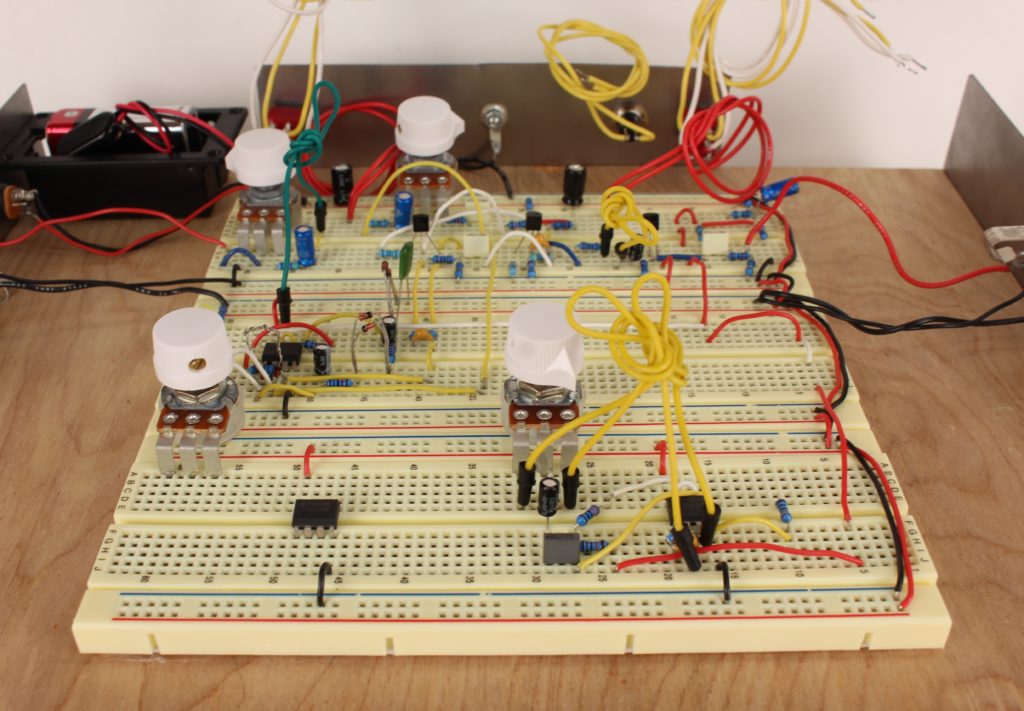Boss HM-2 Heavy Metal Circuit Analysis
Overview – I recently breadboarded the Boss HM-2 Heavy Metal guitar pedal circuit because I was curious about the overall sound and how it works. I’ve owned a couple of Boss HM-2’s in the past, both the Taiwanese and Japanese versions (which I remember being marginally different from each other), but I eventually sold them off. It’s been a few years since I’ve used one so I decided to take this opportunity to see what makes this circuit behave the way it does. I wanted to hear what each section of the circuit does on its own, and then add them together as a complete circuit. I’ve found this method particularly useful when designing my own line of guitar pedals. Here is a picture of the breadboard where I was able to isolate each section:

This video briefly shows what the tone stack is doing without the distortion portion of the circuit. The tone controls boosts or cuts the lows at around 80Hz, and also boosts or cuts the mids between about 900Hz and 1.3kHz. The low control is fairly subtle and more obvious in person, the high control (or midrange control really) is very obvious and the driving force behind the tone stack. The sound is pretty unmistakable:
This video shows what the distortion control sounds like on the Boss HM-2 Heavy Metal circuit without the tone controls. The sweep of the potentiometer is quite limited, and you go from a minimum setting (which is what I had at the beginning) to a maximum setting almost immediately. I decided to dime it for good measure. Interestingly enough the distortion without the tone controls sounds very much like a fuzz. I could envision a number of guitar players being happy using just this sound:
This video clip features a maxed out Ibanez TS9 Tubescreamer going into the HM-2 tone controls (which are also maxed out). I think this shows just how much impact the tone controls have on the overall sound of the HM-2. Using an entirely different distortion yields very similar results to the stock distortion of the HM-2:
Finally, here is a clip of me jamming with the completed circuit. I had quite a bit of fun reintroducing myself to this sound. I panned the music on to the right, and my own playing to the left. The song I chose to cover is Evictionaries by Trap Them off of their album Darker Handcraft:
Conclusion – Having separated the distortion and the tone stack, I feel like they each work on their own as well as together. Personally, I feel that the tone stack is what really gives this pedal its signature sound and that was my biggest takeaway from doing this project. One thing to note is that I powered this circuit with 12VDC. I tried it with 9VDC but it sounded pretty wimpy and not very desirable in my opinion. I know the original was designed to be powered with 12VDC even though there was a diode which dropped the power to around 9VDC. Regardless, I feel the HM-2 works best with a 12VDC power supply.
In addition to my previous thoughts and discoveries, if I were to build this circuit from scratch I would seriously consider using a charge pump. I think it would benefit from having higher voltages throughout the circuit and I may experiment with that down the line. As for signal path, I recorded this with my 2005 Gibson Les Paul Standard, my hand built Fender Champ clone, and a Shure SM57 located in my isolation cabinet loaded with a 12” speaker.
If you have any questions or comments, feel free to message me through the Contact page and I’ll get back to you. Thank you!
-David